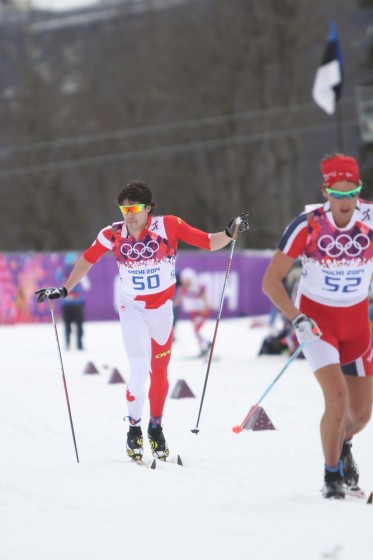
You’re in a ski race. It’s midway through the season, and you’ve been racing better and better – your team is starting to rely on you. This, you think, could be your first top ten. But halfway through the 10 kilometers, your coaches start telling you something else. First your splits have you in 15th. Then in 20th. You try to fight for every spot, but you’re weighed down by a feeling… the feeling that you just aren’t achieving what you set out to do. It’s hard to care about whether you are 22nd or 23rd when you had been planning to fight for many more points than that. And the less you care, the further you slip back.
If you’ve ever had this experience, you’re not alone. It’s so common that scientists have a name for it: competitive suffering. That’s when an athlete feels a sense of failure and helplessness at not being able to achieve a pre-competition goal. It’s an example of a negative affective state, where a person experiences negative emotions and poor perception of themselves (examples of emotions you might feel in a negative affective state include anger, disgust, guilt, contempt, fear, and nerves).
And when you do experience this sense of impending disappointment, you do the same thing that everyone, everywhere, does in discouraging situations: you cope. In a psychological sense, this is defined as constantly re-appraising your environment and yourself and trying to solve the conflict.
As scientists note, athletes pretty often fall short of the lofty goals they set for themselves, so this is fertile territory for research. There’s plenty of studying to be done for anyone who enjoys watching suffering. So far, scientists have done enough work in endurance sports to identify a few main coping strategies.
A positive coping strategy is problem-focused coping, or trying to proactively change the situation. That could include setting a new goal, one that you still have the possibility to achieve. Or it could mean changing your pacing strategy or technique in order to attain a different outcome.
On the other hand, emotion-focused coping (the attempt to ignore negative emotions) and avoidance coping (giving up on the goal completely, and possibly dropping out of the race) usually lead to further stress and negative emotions.
Thinking back to that 10 k race, there’s plenty of time for endurance athletes to think about how they are failing. So recently, Blair Evans of the Wilfred Laurier University in Waterloo, Ontario, set out to investigate how many different strategies athletes use over the course of a frustrating race. He and his co-authors recently published their results in the European Journal of Sport Science.
The researchers used 26 endurance athletes with a wide range of ages and abilities and put them through 5 k running time trials. The runners were told to set a tough but realistic goal time for the trial, which took place on a track, and that they would be given splits on their progress towards attaining that goal time.
They knew that the researchers were studying coping strategies for suffering, but they didn’t know that actually, they were being set up for failure. 2 k into the race, the researchers began giving them negative feedback – that they were 5% over their goal splits – regardless of how the runners were actually doing.
The whole time trial was videotaped for each athlete, and the researchers reviewed the tape with the athlete immediately afterwards and asked them questions about their emotional state throughout the entire race. They then did a separate time-series analysis for each of the three types of coping strategy to see how their use changed over the course of the “competitive suffering task”.
The researchers found that initially, participants were disappointed that they weren’t meeting their splits and considered abandoning their goals. But as the time trial went on, they replaced these avoidance coping strategies with more productive problem-focused strategies. They tried harder to regulate their emotions – in fact, the worse they felt about potential failure, the harder they tried to improve the situation.
Overall, the researchers found that the athletes were fairly successful at banishing their negative outlook, perhaps in part by adjusting their goals to something that seemed more attainable. They note that handling both the emotional situation and the goal-related problem itself go hand in hand for successful coping. Without coping, they say, the unattainable goals can actually lead to worse and worse performance.
So chin up, everyone, even when the going gets tough.
Chelsea Little
Chelsea Little is FasterSkier's Editor-At-Large. A former racer at Ford Sayre, Dartmouth College and the Craftsbury Green Racing Project, she is a PhD candidate in aquatic ecology in the @Altermatt_lab at Eawag, the Swiss Federal Institute of Aquatic Science and Technology in Zurich, Switzerland. You can follow her on twitter @ChelskiLittle.



